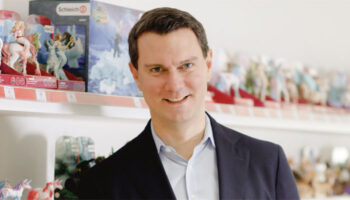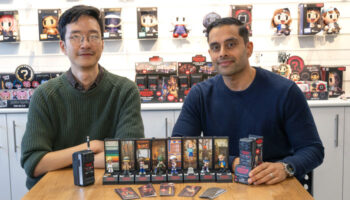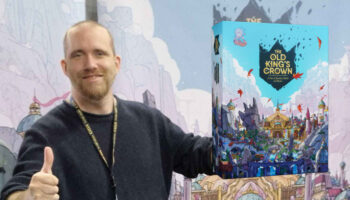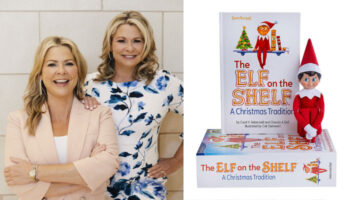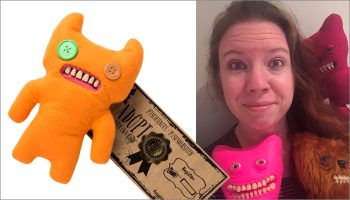Spirograph at 60: Meet Duncan Fisher, son of Denys Fisher – the inventor of Spirograph, Cyclex and Stickle Bricks!

Thanks for joining me, Duncan. We’re here to talk about your dad – Denys Fisher, the inventor of Spirograph.
Thanks for having me, Deej.
My pleasure! This year is the 60th anniversary of the release of Spirograph – and I know you’re comfortable talking about the fact that your dad passed some time ago…
Yes… Sadly, dad passed 23 years ago; 2002. If he was still around, he’d be 107 – so he comes from a totally different era! I’ve still got my mum, though, because she was part of dad’s second family; she was nearly 20 years younger. We’re both pleased that the interest in dad is coming together at this time because there’s not been much out there given how Spirograph influential was…
Well, this is it: Spirograph is one of those products that REALLY clicked with people!
Right. From being dad’s son, l know the number of people that say, “Oh, wow! I loved Spirograph!” But there were some people on whom it made a real impression. They say, “I became a a graphic designer because of that toy!” or “I became an engineer because of that…” They have a really personal connection with it.
And for those that don’t know Spirograph – which can’t be many – it’s one of those products that’s more than a toy, more than a craft product… It’s a very technical invention!
Well, you hit on something very interesting there. That was a a real factor for dad because he stumbled into the toy industry… Dad’s background was engineering and precision engineering. He also had an interest in graphic design and the most brilliant math brain.
He started out in the family engineering business, did he not? Kingfisher Lubrication, in Leeds?
He did. In fact, a short while before Spirograph, dad left the family business and set up on his – a huge gamble, because he had a young family to support… But he got a very lucrative precision-engineering contract designing weapon detonators for NATO. I think one of his first contracts was for 5,000,000 units. From that point of view, it was more than paying the bills. It gave him security; he was living well off it. But the thing is this… Even though he’d worked on weaponry in the family business during the war, and come back to it, dad was a pacifist. So it didn’t sit comfortably with him.

Interesting! He’d worked on weapons during the war, then come back to it later?
Right. But the second time around, I think he couldn’t reconcile it with his beliefs. He was a very peaceful soul; he really wanted to find a new direction. So he began just playing around, really! He got himself a Meccano set and he’d sit and build mechanisms in his spare time in the loft at home…
Other people still do that, by the way… You can go on the internet and find a whole world of these pattern-driven devices that people made from Meccano… Wonderful creations that turn levers and move pens. So that was the kind of thing dad was into because those mechanical pattern-drawing devices did exist back in the day.
And I understand that part of Denys’s inspiration came from looking at an intricate anti-counterfeiting design on a pound note? So was he playing with Meccano because he looked at the pound note? Or was he looking at the pound note because he was playing with Meccano?!
That’s an interesting question! Unfortunately, it might be something we never absolutely pin down… My half-brother Simon might’ve known the answer to that. Unfortunately, Simon wasn’t well by the time we had our in-depth conversations and, sadly, we lost him just recently.
Oh, I’m sorry to hear that. Simon would’ve been around more when your dad created Spirograph, presumably?
Exactly. I wasn’t born, but Simon would’ve been around about 14, 15 or 16. Simon’s little brother was a bit younger so he wasn’t really aware of it… And their older sister was out making her own life by then. So Simon was the one that saw the most when dad invented and started Spirograph. And they kind of worked together as well! Dad would tell Simon his ideas and explain why he was making certain choices.
But Simon shared some of his thoughts with you…
Yes, I got some wonderful emails from him talking about those days. Sadly, this was happening while his health was very precarious. In moments of respite, he wrote down wonderful personal reminiscences about dad and those times. Simon had a wonderful way with words, but there are some follow-up questions that I’ll never get the chance to ask. That said, he absolutely did point to the patterns on the pound notes because they were drawn by early mechanical-drawing devices… They call them rose-engine machines.
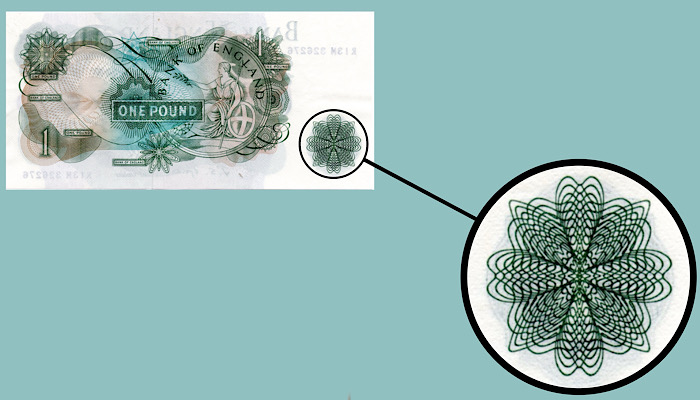
Rose-engine machines?
Rose-engine machines, yes. Dad was aware of those; he found anything like that fascinating. He’d want to know how things like that worked; how – once you set them off – they’d go through all sorts of complicated, intricate geometry. So that pound-note design cause, I think, a spark in his mind in this whole area. And that’s where Simon traced it to.
And we’re celebrating the 60th anniversary now because Spirograph first went on sale in March 1965. Tell me about that. How did it get to market?
It’s a great story, actually! It first went on sale in a very prestigious Central Leeds department store… It doesn’t exist anymore, but it was called Schofields. After dad invented Spirograph, and was happy with it, he made some sets and then – typical dad; he had so many qualities – just turned up at Schofields… He didn’t book an appointment; he just walked in there, tried to work out who was in charge and then said, “Good morning. I’ve got a new product I’d like to sell…” Ha!
Stroll on. They were the days! Ha!
Ha! I remember dad telling this story and saying the chap was a bit short with him at first. It took a while to get past the fact dad hadn’t made an appointment. And in fairness, he didn’t know dad from Adam! My dad’s just turned up with a briefcase and said he had a product… I think a lot of people would say, “Go home and make an appointment!” But dad was a very strong character, very persuasive – reasonable, but a strong will about him. So dad said, “Well look. It won’t take long…”
Right! “I’m here now. Just let me show you…”
Right! So the chap said, “Go on then…” I guess he thought it was just going to be easier to play along and get him out the way. Because he really wasn’t interested. In any case, he lets dad set up his stuff on a counter on the sales floor and go through his spiel. Dad got the set out, and the ring, and starts drawing the patterns and explaining it all. And the guy – who still wasn’t interested – was just waiting to get to the end of this demonstration! But what happened is that – while dad was making all these amazing patterns on the paper – people started asking what it was!
This is like something out of a movie!
Ha! Well, we don’t think of it now, but when Spirograph was brand new, people had never seen anything like it. So these people passing by were just fascinated. They were saying, “Isn’t that clever?” and calling their friends over to look at how this gadget was making all these patterns. And then they started saying, “I’ll take a set!” So the manager had to do a complete 180-degree turnaround because people were offering their money! Dad said you could see the cogwheels turning in this guy’s head…
Pun appreciated! Ha! I have to say, your dad’s brain is fascinating to me. I hear stories of him finding inspiration not only in a pound note but also listening to Beethoven or reading books on Infinitesimal Calculus as a child. So it’s not a surprise to learn he created other things. What else did he invent?
I don’t know if you remember Stickle Bricks, but they were dad’s. The other big one was Cyclex. It’s not as well known as Spirograph, but it sold millions and millions of units. It’s another pattern-drawing toy; simple to use, but the gears and the engineering behind it are very clever. And while Spirograph originally had a map pin to hold things down – and needed revising for health and safety reasons – Cyclex houses its gear wheels in a frame that you just hold.

So those gears move around the frame in a fascinating way… They’re called cycloidal gears; they have quite niche applications in engineering. But with dad’s extensive engineering knowledge, he was aware of that system in a way that most toy designers might not be – it’s very specialist. And by the way: Cyclex is the toy I remember dad inventing when I was growing up in the 1970s.
Which brings us to what many might see as a sensitive subject, Duncan. Because at the height of Spirograph’s success, your dad made some dramatic lifestyle changes…
Well, after dad licensed Spirograph to Kenner, he enjoyed the benefits of having a hugely successful toy! But he wasn’t one for big business; he was happy to let the younger guys run Denys Fisher Toys. He’d bought a big house in the Lake District, which was a place he loved, and spent a lot of his time pottering around there doing all sorts of new inventions. He would’ve been about 50 when – and I think this is the simplest way to explain it – he had a midlife crisis… When you look into where his mind was at that time and try to piece together this time in his life, I think that’s the best way to put it…
The upshot was that he left his wife of 30 years. The three children had all left home by that point; the youngest had gone to college – but dad was very unsettled in the build up to this. He didn’t need to work again, financially, and having the business being run by the other guys– many of whom he’d hired and nurtured – meant he didn’t have so much involvement… But retirement wasn’t for him, you know?
Absolutely. It sounds to me like his brain needed to be busy – and I think retirement is a tricky cove for people like that…
This is it. Dad loved life and he needed to feel alive. A big part of that was having a challenge… So the worst thing that could happen was to have the wind taken out of his sails and to be just drifting. In that respect, I think the crazy amount of money coming off Spirograpgh was a double-edged sword. Plus there were other things.
Such as?
My half brother told me that dad always thought of having five kids. Well, they’d only had three in the first marriage. So when my dad met my mum, who was 20 years younger than him, I think more kids was a big attraction… He wanted to have children again and perhaps spend a bit more time with them – because when his first family was growing up, dad was just a workaholic. I mean… He was still that way in his sixties; I can only imagine what he was like in his twenties, thirties, forties… So it was a sadness for him that he felt he never spent more time with his first family and didn’t get to see them grow up.

But he did spend more time with you?
Oh, yes! My brother and I were very lucky because dad was wealthy by then and we had huge amounts of time with him. He was very present. He sold Denys Fisher Toys to Palitoy and, of course, made sure his first wife was provided for: she never had to worry. There was no nastiness in that sense, but the split itself was – what’s the word? Straightforward… He just left, basically.
Sounds like it would’ve been a shock.
Oh, yes; it hurt his first wife deeply – no doubt about it. But when dad met my mum, he pursued her relentlessly up and down the country! At that time, my mum was a professional woman in her early thirties. She had a good job, a house, a car… They met at a pub and dad took a real shine to her. But mum could tell that this guy was dealing with some things; that he was having a midlife crisis. And I can safely say that mum wasn’t the sort of person to be interested in the fact that dad was wealthy…
So she had real reservations because dad seemed very complicated; he was clearly having a midlife crisis, there was a first wife involved, there was another family… Did she need all that? So the fact is she didn’t fall at his feet. Indeed, when I was writing the books about my dad, I said to mum, “Do you think you sealed your fate by running away?” Because as soon this relationship was something dad thought he couldn’t have, he was never going to let go.
Crikey! Gosh! You’ve mentioned your books, there… I want to come back to those, but I do want to clean things up a bit first – lest it sound slightly sinister. Because I know your parents ended up married for 30 years, so when you say your mum ran away…
Oh, yes… She ran away from dad a couple times. I think you’re right: we do have to keep in mind that they married and stayed together until dad passed; they were together 30 years. They really loved each other. And mum says that when she met dad, he was fascinating… Quite unlike anyone she’d ever met. He had so much insight and such an unusual perspective on life. She could also tell that he was a kind person.
Nevertheless, he had the world telling him – when she met him – that he was a genius – and he had an ego the size of a galaxy! So mum describes getting into that relationship as being like grabbing the tail of a tiger. She didn’t know quite what was going to happen only that is going to be a crazy ride. And it was a big thing because dad was a huge force of personality – but mum saw through the ego and saw his great sense of humour, and the kindness in his eyes.
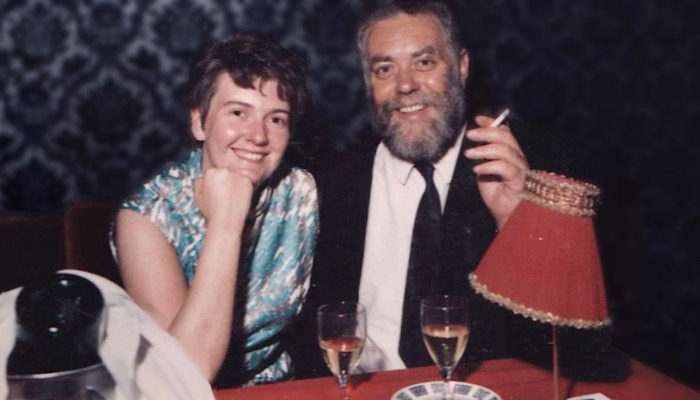
And I know this is quite a big part of your books because it’s such a pivotal moment…
Right. I got my mum to walk me through all the steps of how she went from finding dad an amazing guy, but not wanting to get involved, to thinking it was worth grabbing the tiger’s tail.
Quite a nice turn of phrase. In terms of the books, then, my understanding is that you’ve written two and are looking to publish…
Right. I’m probably going to self-publish the first this year in line with the 60th anniversary. If that gets some traction, then maybe a publisher might come on board for the full thing. The reason I started on the books is that I know that there’s interest in dad… A friend of mine, Charlotte, was the one who eventually forced me to pick up a pen and start! Charlotte’s a writer herself; she loves Spirograph and she wouldn’t let the book idea go! And I’ll be honest with you, Deej: I tried to hold the word count down, but it does feel to me like it needs to be two books to do the story justice.
Right. One is more about Spirograph and the toys, the other is more of a memoir. And on that front, Duncan – before we wrap things up – let me ask you this: what’s your happiest memory of your dad?
Oh, there’re so many, Deej! We just had so many adventures and funny moments, together… From pranking around and all the fun times with this very humorous character to walked together in the Alps, or looking up into the night sky and stargazing together…
I actually begin the book by talking about dad and I stargazing in the garden in Scotland. He was pointing out the various stars, then he turned to me and said, “You do realise that we’re standing on a giant ball of rock? It’s flying through space right now!” And he told me that people get so busy with their lives and jobs that they never stop to consider the marvel of it… How incredible it all is.
That’s quite a memory…
This is why Charlotte was so sure there should be a book about dad – and things like this brought me on board because dad was all about spreading joy and the ability to express ourselves and investigate and play and experiment. That was dad at his core.
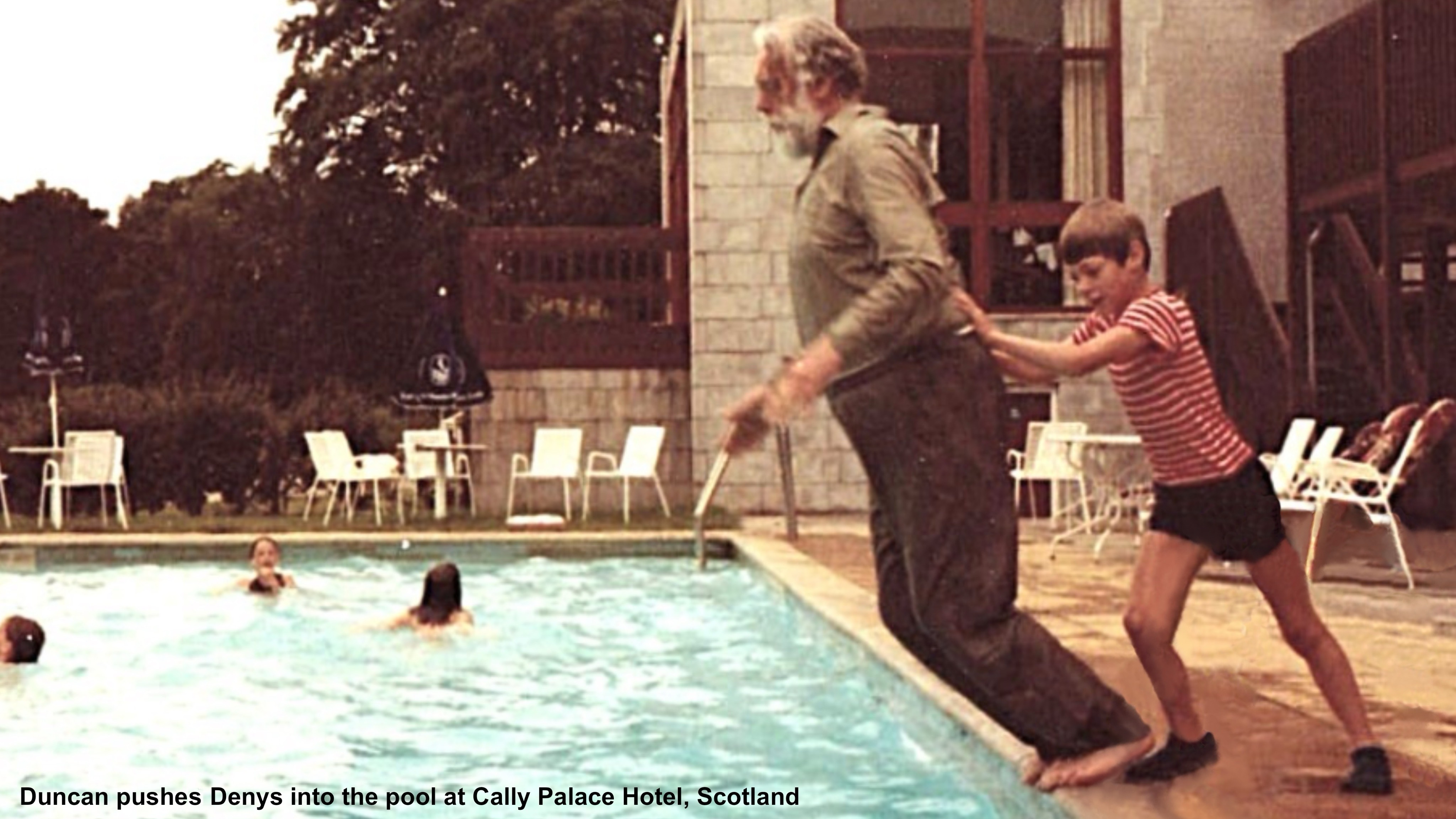
Lovely!
The other memory that comes to mind is from a very personal point of view… I’d been looking after dad up until he was taken into hospital right at the end of his life. We all knew we were losing him – but he wasn’t quite ready to go… He kept himself going an extra three days just through sheer willpower – typical dad, you know?!
Then, on the last day, I got time to spend with dad. He was conscious and lucid. Toward the very end, we just looked into each other’s eyes and I told him I loved him and and that I was so glad he’d been my dad… I’m so glad that I got that chance, Deej, because it was wonderful to be his son. He was such an inspiring, wonderful man. And we knew we were saying goodbye… So in terms of and emotional memory, that is one that I’ll always remember.
Well, thank you for sharing that, Duncan; that’s an extraordinary memory – it’s generous of you to share it. I hope you’ll come back and talk to some more when the books are out.
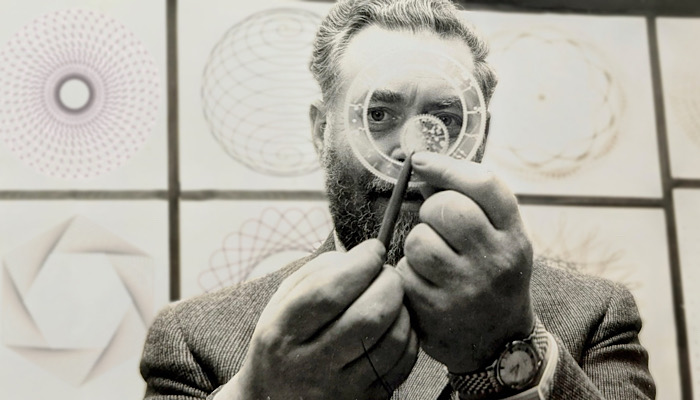
–
To stay in the loop with the latest news, interviews and features from the world of toy and game design, sign up to our weekly newsletter here




